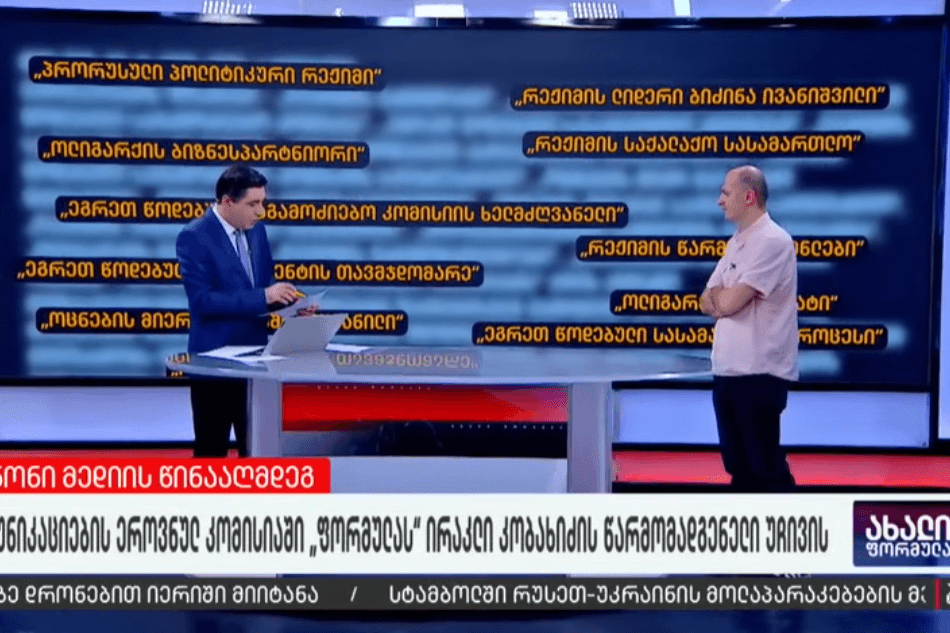
According to the three opposition TV channels — Pirveli, Formula, and Mtavari — the ruling Georgian Dream party filed complaints against them with the National Communications Commission, accusing them of violating coverage standards. The move, reported on Monday, followed legislative amendments to the law on broadcasting concerning the regulation of coverage style for TV broadcasters.
According to the complaints, Georgian Dream objected to specific terms used on air by journalists and on the channels’ social media pages to describe the government, its representatives, and the Georgian judiciary. These included phrases such as ‘illegitimate parliament’, ‘so-called parliament speaker’, ‘oligarch’s MP’, ‘regime’s city court’, and ‘regime prisoners’, among others.
‘The journalist’s phrases [...] are personal assessments/accusations that are not separated from facts. Distinguishing between fact and opinion is an important standard in journalism’, the complaint stated.
The ruling party also included in its complaint a Facebook post by the TV channel in which Prime Minister Irakli Kobakhidze was referred to as ‘the regime’s prime minister’.
Attached to the complaint was a power of attorney authorizing lawyer Natia Bokuchava to represent the ruling party before the Communications Commission. The document was signed by Kobakhidze himself, who also serves as the chairman of Georgian Dream.
The party requested that the commission review what it called the TV channel’s ‘violation’ of legal standards and ‘impose appropriate sanctions within its authority’.
A similar complaint was submitted to the commission against TV Pirveli as well, over the use of terms such as ‘illegitimate government’, ‘Ivanishvili’s regime’ — referring to billionaire and Georgian Dream founder Bidzina Ivanishvili — ‘oligarch’s servant’, and ‘de facto MP’. In this case too, Georgian Dream argued that the failure to distinguish between opinion and fact constitutes a violation of the law.
Another opposition TV channel, Mtavari, which ceased broadcasting in February, also reported receiving a complaint from Georgian Dream over the use of similar terms.
Both complaints are based on legislation adopted on 1 April by Georgian Dream and its allies, which regulates coverage standards for broadcasters on air and on their social media platforms.
Representatives of Georgia’s civil society have emphasised that many of the regulations presented in the law are drawn from the currently existing code of conduct for broadcasters.
However, under the previous legislation, the authority to respond to violations of broadcasting standards lies with self-regulatory bodies within the broadcasters themselves. But by the amendments, the same authority was also granted to a state body — the National Communications Commission.
This means that any interested party can file a complaint directly with a state body against a specific TV channel — as Georgian Dream has done against the the opposition broadcasters.
The punitive measures the commission can take against a broadcaster are varied, and include warnings, orders to correct content, financial penalties, and, in certain cases, suspension of the broadcasting license.
‘This is censorship aimed at the final destruction of the media, which is already in an extremely dire financial situation’, said Formula anchor Vakho Sanaia during Monday evening’s news broadcast while discussing the ruling party’s complaint, adding that the government had launched the ‘final stage of the media’s annihilation’.
‘They will challenge us on every word. This law was designed to dismantle the media’, he added.
For his part, TV Pirveli’s lawyer Tornike Migineishvili, speaking about the impact of the law, added that ‘the period ahead will be even more difficult for critical media’.
‘Most likely, similar mechanisms will be used on a daily basis to restrict journalists — so that they don’t express their own opinions or report facts in a way that is not harsh to listen for Georgian Dream’, he added.
New legislation on the way
The amendments concerning coverage standards are one of many legislative changes adopted by Georgian Dream as part of its broader targeting of the media and civil society.
Another legislative change, passed in the same period, prohibited broadcasters from receiving direct or indirect funding — including money or other material benefits of property value — from ‘a foreign power’.
The list also includes ‘Georgian version of the US Foreign Agents Registration Act (FARA)’, as well as restrictive amendments which introduced the government approval for local organisations to get foreign grants.
The latest draft bill — still pending adoption — would grant the Communications Commission the authority to petition the court for access to confidential financial information about broadcasters from banks.
According to the bill’s explanatory note, the law on broadcasting includes a range of restrictions concerning broadcasters’ funding, including bans on financing from ‘foreign powers’. The bill’s authors claimed that the existing legislative mechanisms are insufficient for the effective enforcement of these regulations and others, thereby necessitating the proposed changes.
Georgian Dream fastracked their adoption of restrictive legislation after the start of anti-government protests in late November last year, which were sparked by the ruling party’s announcement that it was halting the country’s EU membership bid.
Georgian Dream has repeatedly claimed that the new bills were necessary to fight the ‘influence of external powers’. Nonetheless, critics of the ruling party have emphasised that these changes aim to undermine the media and civil society in an already fragile democracy.
The restrictive laws are being passed in a parliament where opposition is virtually nonexistent, having vowed to boycott the legislative body following the disputed 2024 parliamentary elections, before being expelled en masse from parliament by Georgian Dream.
Since then, the ruling party has been initiating and passing new restrictive legislations without any obstacles, targeting the media, civil society, and other critics.











